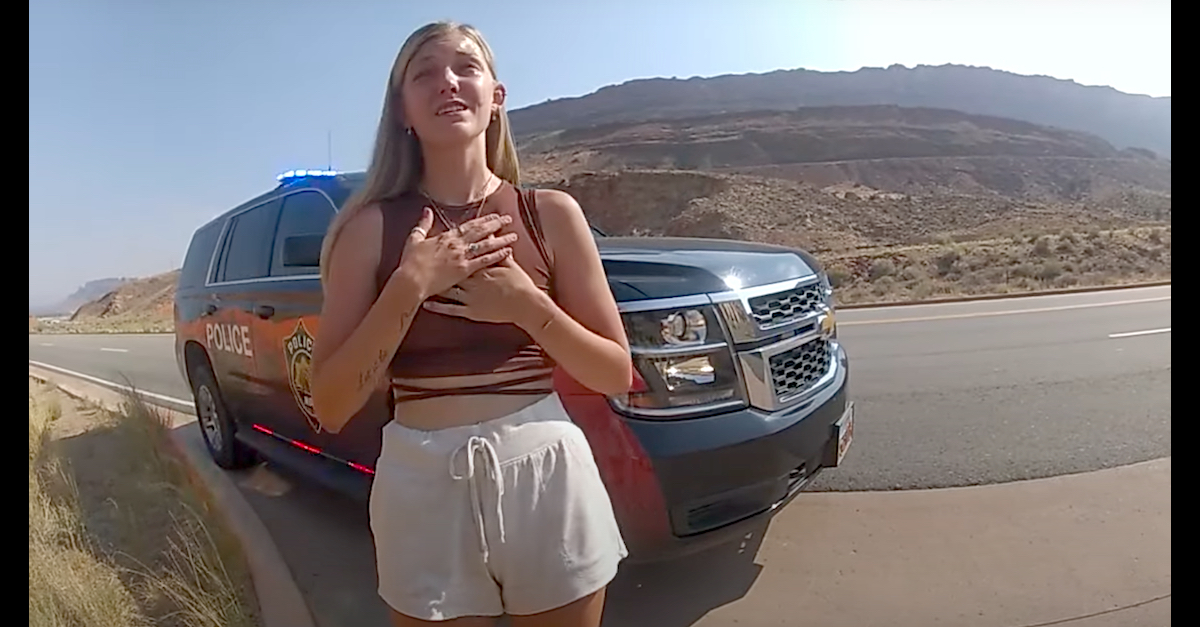
Gabby Petito appears in an Aug. 12, 2021 Moab, Utah police body camera video.
The family of Gabby Petito is suing the Moab, Utah police department over a fateful Aug. 12, 2021 interaction between Petito, her fiancé and killer Brian Laundrie, and local officers.
“The purpose of this lawsuit is to honor Gabby’s legacy by demanding accountability and working for change in the system to protect victims of domestic abuse and violence and to prevent such tragedies in the future,” attorney James W. McConkie said of the case during a press conference.
The lawsuit, filed Thursday morning, alleges four causes of action: (1) negligence, (2) negligent hiring and supervision, (3) survival, and (4) wrongful death, according to a copy of the complaint obtained by Law&Crime.
Survival actions are generally pressed on behalf of a decedent’s estate to compensate for the decedent’s own losses. Wrongful death actions are pressed by a decedent’s relatives as similar yet separate matters.
The lawsuit seeks damages “in excess” of $50 million on the first three counts and “in excess” of another $50 million on the fourth count.
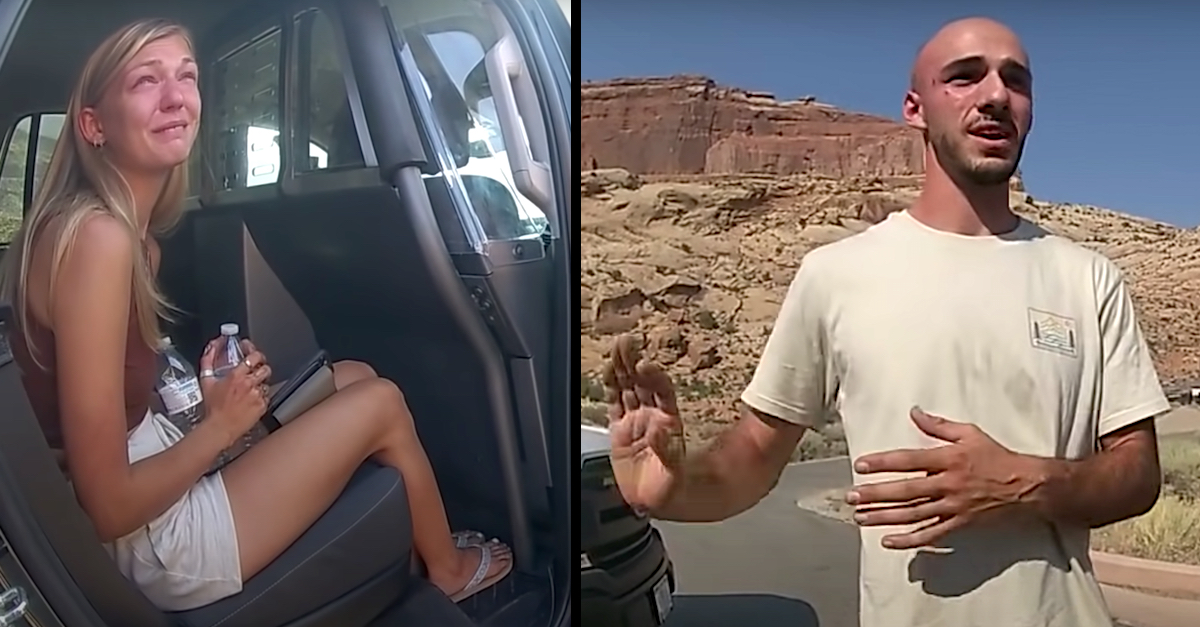
Gabby Petito and Brian Laundrie appear in Aug. 12, 2021 Moab, Utah police body camera videos.
Besides the police department as an entity, the lawsuit also names Moab Police Chief Bret Edge, Assistant Police Chief Braydon Palmer, officer Daniel Robbins, and then-officer Eric Pratt. Pratt is now a detective on the Moab police force, according to the lawsuit. Several John Does who are presumably connected to the case are also named.
“If the Moab police had followed the requirements of the Utah law — the Utah statutes on domestic violence — Gabby would still be alive today,” McConkie continued while describing the crux of the wrongful death claim.
The lawyer for the Petito family said the “signs and symptoms” of domestic abuse were present when Moab officers interviewed Laundrie and Petito during the Aug. 12, 2021 traffic stop — but that oftentimes the problems are not immediately apparent to laypeople.
“They are recognized by police officers who are trained to stop and intervene in these kinds of situations,” McConkie said.
“They’re the last stop in a course of conduct that can lead to serious violence and death,” the lawyer continued, this time referencing the police.
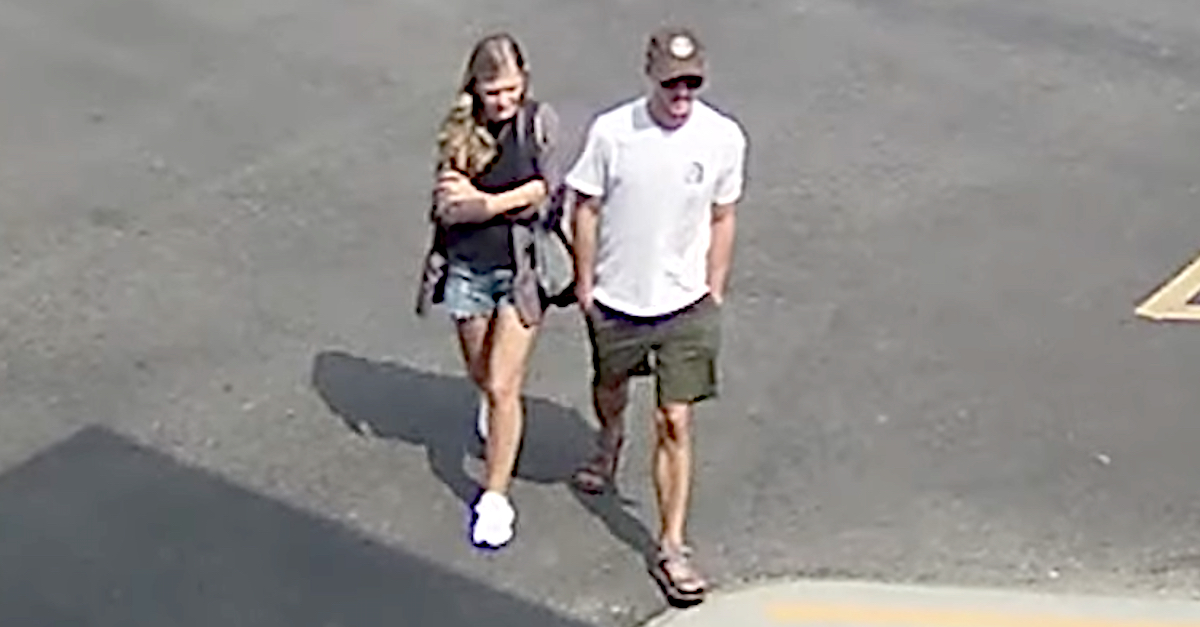
Gabby Petito and Brian Laundrie are seen entering a Whole Foods grocery store in Wyoming on Aug. 27, 2021. The recordings are believed to be the last of Gabby Petito alive.
Specifically, the lawsuit says a witness “observed Brian hitting Gabby” and called 911. The response was dismal, the lawsuit claims:
Brian grabbed Gabby by the face so forcefully that he cut her cheek and drew blood. Gabby took a photograph of her injury, which shows blood across her nose and left eye. Gabby pointed out the injury to Officer Pratt, but he ignored her and did nothing more to investigate or document the injury.
McConkie said the police — and Pratt specifically — grasped for “loopholes” to avoid having to act rather than to actively enforce the law as it is written.
Bodycam footage of the Aug. 12 police stop has long been public. Attorney Brian C. Stewart, who is also representing Petito’s family, said “it became clear the officers involved did not fully investigate the threat Gabby faced and did not follow the law.”
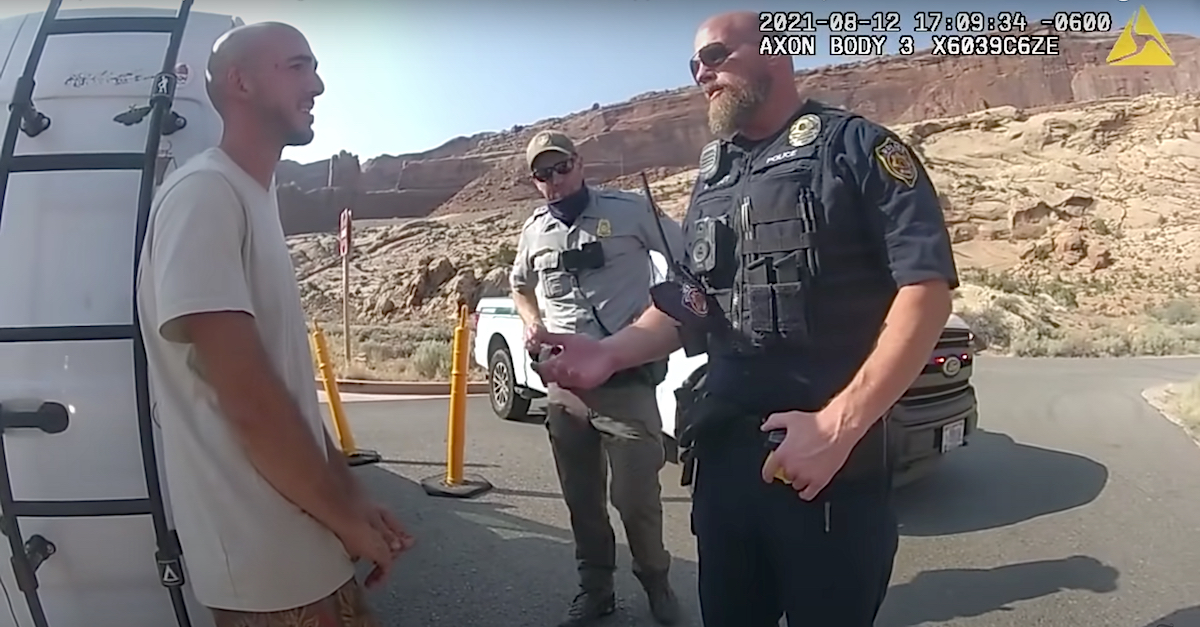
Brian Laundrie (left) speaks with Moab, Utah police officer Eric Pratt on Aug. 12, 2021. (Image via body camera/YouTube screengrab.)
Stewart directly called out Pratt, who was seen on the bodycam video responding the call, as a “domestic abuser who has misused authority and threats of violence to control and intimidate sexual partners, making clear why Officer Pratt was fundamentally biased in his approach to the investigation.”
Stewart alleged that Pratt identified with Laundrie as an abuser, ignored Petito, and looked for “loopholes” that would cover his desire not to take action. Stewart also alleged that Pratt failed in his “duty to protect Gabby.”
“The Moab City Police Department knew, or should have known, that Officer Pratt, who has a history of pervasive professional and sexual misconduct, including sexual harassment and intimate partner violence, was unfit and unsafe to be a police officer,” Stewart further alleged.
Stewart cited Pratt’s comments from the scene on Aug. 12.
“I don’t care if we use the actual letter of the law,” Pratt allegedly said at the scene, according to Stewart and to the complaint itself.
That comment came after Pratt noted that “many times, women who are at risk want to go back to their abuser” and sometimes wind up dead, Stewart said.
The lawsuit paperwork describes Pratt’s history as checkered and argues that he should not have been hired in Moab in the first place:
Between 2008 and 2017, Officer Pratt served as an officer and then as police chief in Salina, Utah. During his time as police chief in Salina, Pratt carried on several extra-marital affairs in the small town. One of the women (“Witness 1”) Pratt was involved with between approximately March 2017 and June 2017 has provided credible testimony that Pratt improperly used his position to use government buildings for sex. Witness 1 states that it was Pratt’s regular practice to not follow through on investigations or to sweep cases under the rug to avoid work, stating “It’s too much paperwork,” or “There’s no way I’m doing all that paperwork.”
Witness 1 states that Pratt improperly used his position as police chief to improperly manipulate her and to sexually harass her. Witness 1 states that when she intended to disclose Pratt’s pervasive misconduct, Pratt threatened to kill her. Pratt pulled Witness 1 over in her car, with her 5-year-old daughter in the back seat. Pratt credibly and clearly threatened her stating, “If any of this gets out, I will kill you with a crowbar.” On another occasion, Pratt told her that he had been so angry with her that, “If this had been a week ago, I would have been digging a grave and you would have been in it.”
As a domestic abuser himself, who has used authority and threats of physical violence to control and intimidate sexual partners, it becomes clear why Officer Pratt was fundamentally biased in his approach to the investigation, identifying with Gabby’s abuser, ignoring the victim, and intentionally looking for loopholes to get around the requirements of Utah law and his duty to protect Gabby.
When the alleged conduct was reported, Pratt resigned, according to the lawsuit. The document quotes Pratt as saying he was “leaving full-time law enforcement” to “pursue other interests and experience life from new vantage points.”
But instead, he was eventually hired in Moab, according to the complaint:
After resigning as police chief in Salina, Pratt explained in publicly published statements online and in podcasts that he had become “disillusioned” with police work and that it was his practice to find “loopholes” to avoid applying the law, stating “I’d find my own loopholes, perfectly legal and I think very . . . just loopholes.”
[ . . . ]
As an officer who described himself as being “disillusioned” with police work and admitted to “finding loopholes” to avoid applying the law, Officer Pratt should never have been rehired as an officer for the Moab Police Department. Pratt’s dangerous approach is evident throughout his interaction with Gabby and Brian as he manipulated the investigation by intentionally looking for loopholes to get around the requirements of Utah law and his duty to protect Gabby.
“Changes need to come,” said Joseph Petito, Gabby’s father, at Thursday’s press conference.
“We’re pretty broken because of it,” Gabby’s mother Nichole Schmidt said while holding back tears. “We miss her so much. We saw it [the lawsuit] as an opportunity to help other families. Again, I would reiterate that we’d have her back in a heartbeat because she’s what’s important, but we feel we need to bring justice because she could have been protected that day. There are people — laws put in place to protect victims, and those laws were not followed, and we don’t want this to happen to anybody else. And it keeps happening. They know. It keeps happening. We just want to stop it.”
Joseph Petito implored anyone watching the news conference who was being affected by domestic violence to reach out to hotlines and organizations that can help. Nichole Schmidt said she’s been told that some people have been motivated to leave abusive relationships because of Gabby’s story.
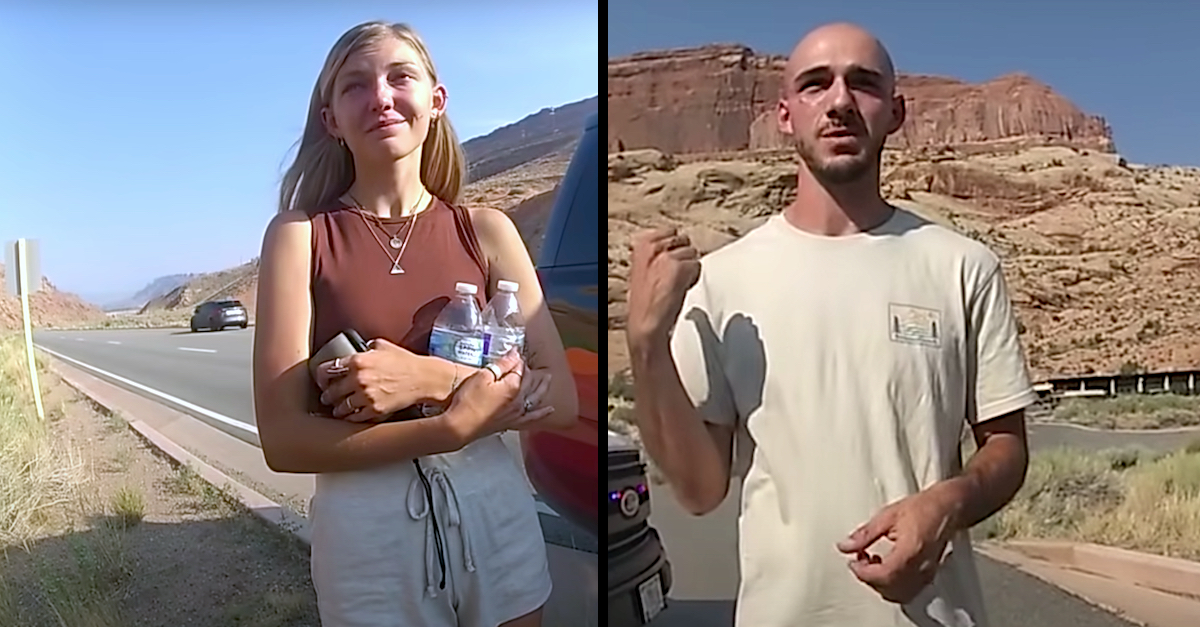
Gabby Petito and Brian Laundrie appear in Aug. 12, 2021 Moab, Utah police body camera videos.
Moab City spokesperson Lisa Church responded to the lawsuit in a statement to Salt Lake City CBS affiliate KUTV:
The death of Gabrielle Petito in Wyoming is a terrible tragedy, and we feel profound sympathy for the Petito and Schmidt families and the painful loss they have endured. At the same time, it is clear that Moab City Police Department officers are not responsible for Gabrielle Petito’s eventual murder.
Ms. Petito is believed to have died in Wyoming in late August 2021, more than two weeks after she and Brian Laundrie visited Moab and interacted with Moab City Police. At that time, our officers acted with kindness, respect, and empathy toward Ms. Petito.
The attorneys for the Petito family seem to suggest that somehow our officers could see into the future based on this single interaction. In truth, on Aug. 12, no one could have predicted the tragedy that would occur weeks later and hundreds of miles away, and the City of Moab will ardently defend against this lawsuit.
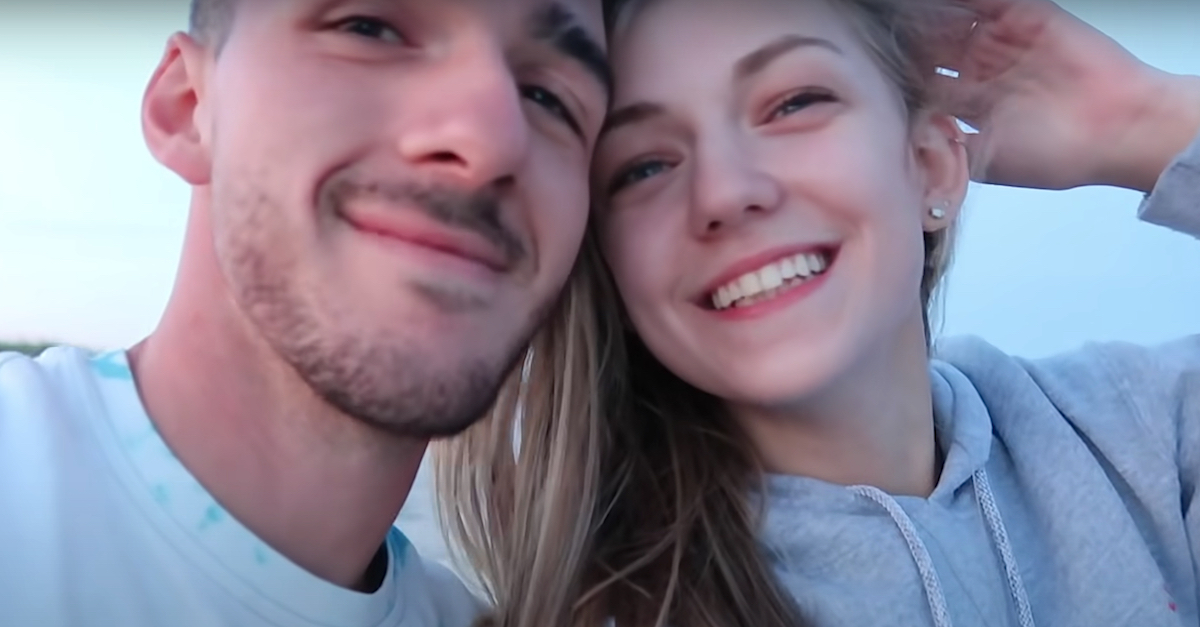
Brian Laundrie and Gabby Petito. (Image via screengrab from YouTube/Nomadic Statik.)
According to the authorities, Laundrie, 23, wrote in a notebook that he killed Petito, 22, in Wyoming’s Spread Creek Dispersed Camping Area. The young couple had embarked upon a cross-country van trip and posting about their adventures on social media. On Sept. 1, 2021, Laundrie returned alone to Florida in the van he and Petito had been using. Laundrie vanished on Sept. 13, 2021. His Ford Mustang convertible turned up near the entrance to the Myakkahatchee Environmental Park — which is adjacent to the vast Carlton Reserve in Sarasota County — on Sept. 14, 2021. In the confines of those wildlife habitats, Laundrie penned a confession and took his own life.
Searchers found Petito’s body in Wyoming on Sept. 21, 2021. A coroner determined that Petito’s cause of death was strangulation and that the manner of her death was homicide. Searchers found human remains on Oct. 20, 2021, in the aforementioned Florida park and refuge area; they were later determined to be Laundrie’s.
Petito’s parents are separately suing Laundrie’s parents in Florida.
The full lawsuit is available here.